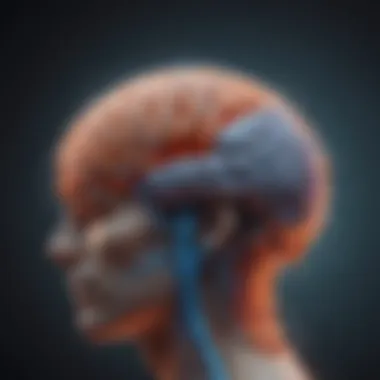Unlocking the Intricate Bond Between Mind and Body: A Deep Exploration


Understanding Resilience, Well-Being, and Adaptability
In delving into the intricate relationship between the mind and body, understanding resilience, well-being, and adaptability emerges as fundamental pillars. Resilience, the capacity to bounce back amidst challenges; well-being, the holistic state of thriving; and adaptability, the ability to adjust to varying circumstances, form the bedrock of optimal mental and physical health. Recognizing the importance of these factors is paramount in both personal and organizational development.
Importance of Resilience, Well-Being, and Adaptability
Resilience enables individuals to navigate life's adversities with grace, fostering mental toughness and emotional stability. Well-being encompasses physical health, emotional balance, and a sense of purpose, contributing to overall life satisfaction. Adaptability, crucial in a rapidly changing world, allows for agile responses to new situations, promoting growth and learning.
Cultivating resilience, well-being, and adaptability creates a robust foundation for personal development and professional success.
Strategies for Cultivating Resilience and Well-Being
Exploring practical strategies for nurturing resilience and well-being unveils a treasure trove of techniques. From mindfulness practices to relationship-building skills, individuals can enhance their psychological flexibility and emotional intelligence. Engaging in physical activities, fostering social connections, and pursuing meaningful goals all play pivotal roles in fortifying mental health and overall well-being.
Integration of AI Technology in Coaching
The integration of AI technology in coaching heralds a new era of personalized and data-driven support for individuals and organizations. Leveraging artificial intelligence amplifies the efficacy and reach of coaching solutions, streamlining processes and enhancing outcomes.
AI Technology in Coaching: A Transformative Approach
AI-driven coaching solutions revolutionize the coaching landscape by offering tailored insights, predictive analytics, and real-time feedback. By harnessing the power of data and algorithms, coaches can provide more personalized and impactful guidance to their clients, fostering sustainable growth and development.
The fusion of AI technology and coaching holds immense potential for optimizing personal and professional performance.
Successful Implementation of AI Technology
Case studies showcasing the successful implementation of AI technology in coaching underscore its tangible benefits. From improving decision-making processes to enhancing self-awareness and goal attainment, AI tools empower individuals to unlock their full potential and achieve lasting change.
Leveraging Behavioral Science for Personal Growth
Unpacking the key principles of behavioral science unveils a roadmap for personal development grounded in empirical research and psychological insights. By aligning behavior with intentions and creating conducive environments for change, individuals can propel themselves towards their desired outcomes.
Key Principles of Behavioral Science
Behavioral science elucidates the mechanisms that drive human behavior, offering valuable frameworks for understanding motivation, habit formation, and decision-making. By applying these principles to daily life, individuals can cultivate habits that support their well-being and propel them towards their goals.
Behavioral science serves as a guiding light, illuminating the path to sustainable personal growth and transformation.


Applications in Personal Development
Practical applications of behavioral science empower individuals to make intentional choices that align with their values and objectives. By leveraging techniques such as positive reinforcement, goal setting, and environmental design, individuals can optimize their habits and behaviors for enhanced well-being and productivity.
Interactive Tools for Self-Improvement
Interactive tools offer a dynamic and engaging platform for individuals to embark on their journey of self-improvement. By providing actionable insights, personalized recommendations, and progress tracking features, these tools empower users to take charge of their well-being and personal growth.
Utilizing Interactive Tools Effectively
Maximizing the benefits of interactive tools requires a strategic approach that aligns with individual goals and preferences. By exploring different features, seeking feedback from peers, and tracking progress over time, users can harness the full potential of these tools to facilitate transformative growth.
User testimonials praising the impact of interactive tools underscore their effectiveness in driving sustainable change and fostering personal development.
Preface
Understanding the Mind-Body Connection
The Historical Context of Mind-Body Relationship
Exploring the historical backdrop of the mind-body relationship unveils a tapestry of ancient philosophies and modern scientific developments that have shaped our understanding today. This section delves into the evolution of perspectives on how the mind and body interact, tracing foundational theories that laid the groundwork for contemporary research. Gaining insight into historical narratives not only enriches our grasp of this symbiosis but also underscores the importance of context in interpreting present-day findings.
The Emergence of Integrative Approaches
The emergence of integrative approaches signifies a paradigm shift towards a more unified view of mind and body interactions. By synthesizing diverse methodologies from psychological, medical, and spiritual realms, integrative approaches offer a comprehensive framework that addresses the complexity of human well-being. This section elucidates the synergistic fusion of different modalities, highlighting the synergies that emerge when traditionally distinct practices converge. Understanding the strengths and limitations of such integrative paradigms is fundamental in navigating the nuanced landscape of mind-body connections.
The Influence of Thoughts on Health
By exploring the psychosomatic phenomena within the realm of health, we can unravel the complex web of interactions between the mind and the body. Psychosomatic phenomena refer to the manifestations of psychological factors in physical symptoms. This phenomenon illustrates how our thoughts and emotions can trigger real physiological responses, showcasing the profound connection between our mental and physical states.
Illustrating mind-induced physical responses within the context of psychosomatic phenomena offers a nuanced understanding of how our mental processes can influence bodily functions. This aspect underscores the dynamic nature of the mind-body connection, emphasizing the need to address both psychological and physical aspects to achieve optimal health.
The intertwining of thoughts and health reveals a fascinating interplay between the cognitive and physiological realms, shedding light on the profound impact of our mental landscape on our physical well-being.
Case studies on psychosomatic illnesses provide concrete examples of how psychological factors can contribute to the development and progression of physical ailments. By examining real-life instances where thoughts and emotions affect health outcomes, we gain valuable insights into the importance of considering the mind-body connection in medical diagnosis and treatment.
In the realm of Neuroplasticity and Mental Well-being, we scrutinize the brain's remarkable ability to adapt and reorganize itself in response to experiences. This section unpacks the concept of neuroplasticity and its implications for mental health interventions, underscoring the brain's capacity for change and growth.


By understanding The brain's capacity for adaptation, we unlock new possibilities for enhancing mental well-being through targeted interventions. This aspect accentuates the flexibility of the human brain, demonstrating how individuals can harness neuroplasticity to foster emotional resilience and cognitive growth.
Implications for mental health interventions elucidate how insights from neuroplasticity research can inform therapeutic approaches aimed at promoting emotional well-being. By tapping into the brain's adaptive mechanisms, mental health professionals can devise strategies to support individuals in overcoming challenges and optimizing their psychological functioning.
The Physical Manifestation of Emotions
The Physical Manifestation of Emotions plays a pivotal role in understanding our overall well-being. By comprehending how our emotions manifest physically, we can grasp the intricate connection between our mind and body. This section delves into the profound impact emotions have on our physical health and outlines essential considerations for achieving emotional balance through bodily awareness.
Biological Responses to Emotions
Stress hormones and their impact
Discussing stress hormones is crucial in elucidating how our body reacts to emotional stimuli. Stress hormones, such as cortisol and adrenaline, are intricate components of our fight-or-flight response. In this context, they contribute significantly to our overall physiological state when experiencing emotional distress. Understanding the key characteristics of stress hormones enlightens us on their role in the mind-body relationship within the purview of this article. Despite being chemically potent in acute stress responses, chronic activation of these hormones can have detrimental effects on our health. Their unique feature lies in modulating various bodily functions, showcasing both advantages and disadvantages within the realms of mind-body coherence.
The immune system's sensitivity to emotions
Analyzing the immune system's sensitivity to emotions sheds light on how emotional states impact our immunological responses. The immune system's intricate connection to emotional well-being underscores its importance in maintaining overall health. Recognizing the key characteristic of this interaction elucidates why it is a prominent topic in this discourse. The unique feature of the immune system's reactivity to emotions lies in its dynamic modulation based on our mental states, showcasing both advantages and disadvantages in the context of this article.
Somatic Symptom Disorders
Exploring the connection between emotions and physical symptoms
Exploring the connection between emotions and physical symptoms is essential for understanding somatic symptom disorders and their implications. This aspect contributes significantly to the holistic view of mind-body integration by unraveling how emotional turmoil can manifest as physical ailments. Highlighting the key characteristic of this connection emphasizes its importance in the narrative of this article. The unique feature of this exploration lies in bridging the gap between emotional inner turmoil and external physical manifestations, offering insights into both its advantages and disadvantages within this article's scope.
Diagnostic criteria and treatment approaches
Delving into diagnostic criteria and treatment approaches for somatic symptom disorders provides a structured approach to addressing mind-body afflictions. By elucidating specific criteria for diagnosis and optimal treatment modalities, we aim to enhance the reader's comprehension of managing these complex conditions. By highlighting the key characteristics of diagnostic strategies and treatment modalities, we underscore their significance in the overall theme of this article. The unique feature of this approach lies in its tailored methods to bridge emotional distress with physical symptoms, offering both advantages and disadvantages for consideration within this article.
Holistic Practices for Mind-Body Harmony
Holistic practices play a crucial role in fostering a harmonious relationship between the mind and body. In the context of this article, focusing on the integration of holistic practices for mind-body harmony is vital for comprehending the depth of interconnectedness between mental and physical well-being. By delving into various holistic approaches such as meditation, yoga, and mindfulness, individuals can attain a balanced state of being that nurtures both mental and physical health.
Meditative Techniques and Neural Pathways
The impact of meditation on brain structure
Meditation exerts a profound influence on the brain's structure, inducing notable alterations in neural pathways associated with attention, emotional regulation, and self-awareness. This aspect of meditation is instrumental in enhancing cognitive functions, reducing stress levels, and promoting overall mental well-being. The adaptability of the brain's structure in response to regular meditation contributes significantly to optimizing brain function and emotional resilience.


Cultivating emotional regulation through mindfulness
Mindfulness practices enable individuals to cultivate emotional regulation by fostering present-moment awareness and acceptance of internal experiences. By cultivating an attitude of non-judgment towards emotions, individuals can skillfully manage and respond to emotional challenges. The emphasis on mindfulness in this article underscores its efficacy in promoting emotional balance, reducing reactivity to stressors, and enhancing overall psychological resilience. Embracing mindfulness as a tool for emotional regulation yields profound benefits for holistic well-being.
Optimizing Well-being Through Integrated Approaches
Optimizing well-being through integrated approaches encapsulates a holistic paradigm that converges various facets of health optimization. In this segment, we delve into the pivotal role of nutritional psychiatry, mental health, and tailored movement practices in fostering overall well-being. By amalgamating diverse disciplines, individuals can achieve a comprehensive state of balance and vitality.
Nutritional Psychiatry and Mental Health
Nutritional influences on mood and cognition
Nutritional influences on mood and cognition permeate the realm of mental health by intricately modulating brain function and emotional balance. The consumption of specific nutrients not only fuels physiological processes but also impacts neurotransmitter production, influencing mood and cognitive functions. Incorporating a diet rich in omega-3 fatty acids, vitamins, and antioxidants holds the potential to cultivate a positive mental state and enhance cognitive performance. This nuanced interplay between nutrition and mental health underscores the significance of dietary choices in optimizing overall well-being.
Evidence-based dietary strategies for mental well-being
Evidence-based dietary strategies serve as a cornerstone in augmenting mental well-being by providing a scientific framework for personalized nutritional interventions. By tailoring dietary plans to individual needs and considering factors such as micronutrient balance and gut health, these strategies aim to enhance cognitive function and emotional equilibrium. Embracing evidence-based dietary approaches offers a sustainable and effective means of nourishing both the body and mind, fostering enduring mental wellness. Integrating these strategies into daily life can lead to profound improvements in mental health outcomes, underscoring their relevance in the pursuit of holistic well-being.
Movement as Medicine
The physiological benefits of exercise on mental health
The physiological benefits of exercise extend beyond physical fitness to encompass a fundamental role in enhancing mental well-being. Engaging in regular physical activity stimulates the release of endorphins, neurotransmitters that promote feelings of euphoria and reduce stress levels. Moreover, exercise facilitates neurogenesis and neuroplasticity, enhancing cognitive function and mood regulation. By harnessing the transformative power of movement, individuals can fortify their mental resilience and attain a heightened sense of psychological well-being.
Tailored movement practices for emotional balance
Tailored movement practices offer a tailored approach to emotional balance by integrating physical exercises that target specific emotional states. From yoga sequences that promote relaxation to high-intensity workouts that boost motivation, these practices cater to diverse emotional needs. By customizing movement routines to correspond with emotional requirements, individuals can cultivate a harmonious equilibrium between body and mind. This personalized approach not only enhances emotional awareness but also fosters a deeper connection with one's physical and mental dimensions.
The Future of Mind-Body Medicine
The section on The Future of Mind-Body Medicine is paramount within the context of this comprehensive exploration. Here, we delve into the innovative advancements that hold promise for reshaping our approach to health and wellness in the coming years. The significance of foreseeing the evolution in this field lies in aligning our practices with cutting-edge technologies and methodologies that can revolutionize how we perceive and address the symbiosis of mind and body.
Technological Advancements in Psychosomatic Research
Virtual Reality Applications for Mind-Body Interventions
Discussing the specific realm of Virtual reality applications for mind-body interventions unveils a novel approach to enhancing mental and physical well-being. By immersing individuals in simulated environments, this technology offers a platform for therapeutic interventions that bridge the gap between psychological and physiological aspects. The key characteristic lies in the immersive nature of virtual reality, enabling users to engage with their internal states in a visually captivating manner. This approach proves advantageous in stimulating emotional responses and facilitating self-awareness, making it a popular choice for integrating mind-body practices. Despite its efficacy, challenges such as user adaptation and limited accessibility should be acknowledged for a comprehensive understanding.
Biofeedback Mechanisms for Self-Regulation
Exploring the realm of Biofeedback mechanisms for self-regulation uncovers a sophisticated method for empowering individuals to manage their physiological responses consciously. By providing real-time feedback on internal functions like heart rate variability and skin conductance, this approach equips individuals with the tools to monitor and modulate their stress responses effectively. The key characteristic of biofeedback lies in its personalized feedback loop, facilitating a targeted approach to self-regulation. Its popularity stems from the tailored interventions it offers, aligning with the holistic nature of mind-body practices. However, challenges related to device reliability and data interpretation underscore the need for further refinement in utilizing biofeedback mechanisms for self-regulation.
The integration of virtual reality applications and biofeedback mechanisms marks a significant stride towards empowering individuals with tools for fostering mind-body harmony. Embracing these technological advancements paves the way for a future where personalized, data-driven interventions redefine our approach to holistic well-being.



